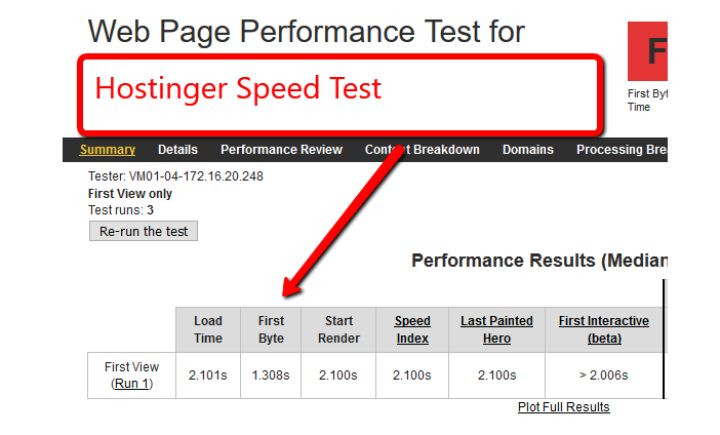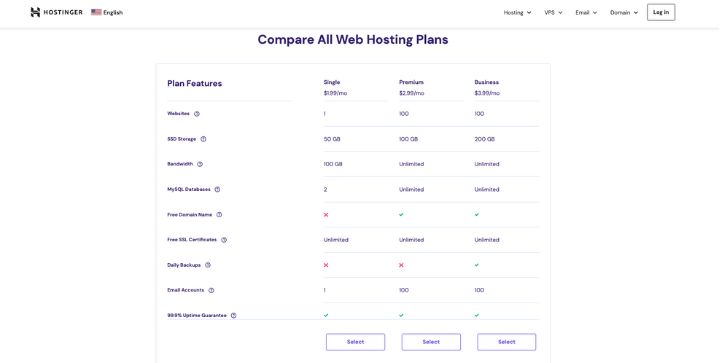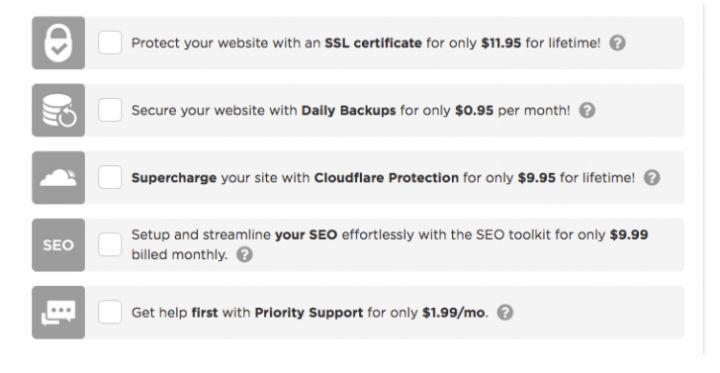Hostinger Review
| Support | Help Desk, Videos & Knowledge Base |
|---|---|
| Uptime | Good (99.94% past 6 months) |
| Guarantees | Uptime & 30-Day |
| Free Migration | |
| Best For | Cheap web hosting |
| Strengths | Multiple Data Centers To Pick From |
| Weaknesses | Limited Support & Uneven Performance |
| Promotion | Starting At $1.99/mo |
Who Is Hostinger?
Hostinger is a European web hosting company offering hosting plans that cater to individual website owners and businesses. They also offer email, a website builder, and other services to over 29 million users.
Hostinger is also the parent company of the 000Webhost, Niagahoster, and Weblink brands.
I’ve had several readers email to ask my opinion about Hostinger, so I decided to use their service for a small project.
Here’s my Hostinger review based on my experience as a customer, complete with key features, pricing, pros & cons, and more.
Hostinger Plans
| Plan | Single | Premium | Business |
|---|---|---|---|
| Initial Price* | $1.99/mo. | $2.99/mo. | $3.99/mo. |
| Renewal Price | $3.99/mo. | $6.99/mo. | $8.99/mo. |
| Websites | 1 | 100 | 100 |
| Storage | 50 GB | 100 GB | 200 GB |
| Bandwidth/month | unmetered | unmetered | unmetered |
| Free Domain Name | 1 year | 1 year | |
| Free SSL | |||
| CDN | |||
| Dedicated IP | |||
| Daily Backups |
Pros Of Hostinger
If you have a small website or a collection of small sites, you’ll like what Hostinger offers. Their main advantages lie in their onboarding and competitive pricing. Here’s my list of Hostinger’s pros and cons.
Excellent Onboarding
It couldn’t be easier to get set up with Hostinger. Their onboarding process is laid out step-by-step and includes educational content for users who may be new to creating a website and unsure of certain terms. As I set up my Hostinger site, there was never a moment where I wondered what I was supposed to do next.
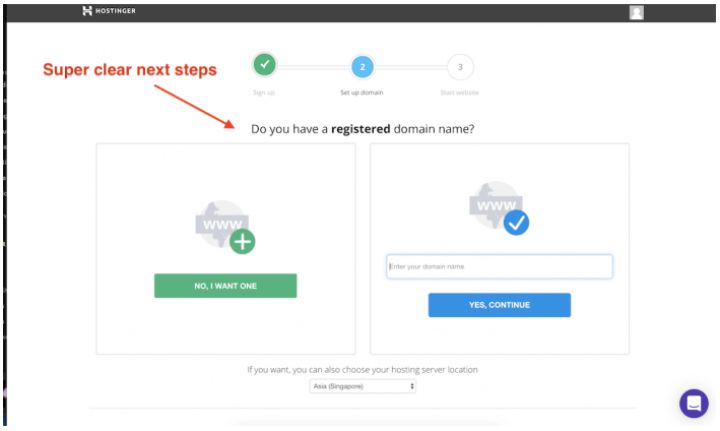
For website owners new to hosting, this step-by-step process and additional information are extremely useful (without being overwhelming or “sales-y”) and help to ensure you finish the set-up process.
Competitive Pricing
At first glance, Hostinger’s pricing looks pretty hard to beat. Their pricing is their claim to fame in the hosting industry.
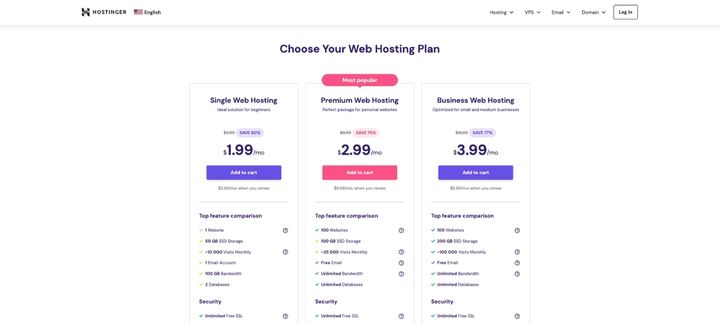
And it is cheap, but there are some strings attached. Looking more closely, you’ll notice that to secure Hostinger’s lowest advertised rates, you’ll need to choose the 48-month plan. As is normal with web hosting companies, the price increases significantly at renewal.
Still, web hosting for less than $25 per year is incredible. Hostinger also offers a full refund within your first 30 days, and there aren’t any hidden fees or surprises (like set-up fees, etc.)*.
*Hostinger is missing some essential services, which I’ll cover later.
While pricing isn’t the only factor to consider when choosing your hosting company, if you’re looking to test run a company that you may decide to stick with long-term, Hostinger isn’t a bad option.
Multiple Data Centers
Hostinger offers multiple server locations, allowing website owners to choose the closest location to their customers for faster website loading speeds.
Hostinger is on par with other brand names, i.e., SiteGround, that maintain data centers in these regions. If you have customers in Europe or Asia, this is a huge pro. It probably doesn’t matter much to you if you’re just looking to serve those in the US.
Cons Of Hostinger
Like any web host, Hostinger has its drawbacks. There are plenty of Hostinger complaints to be found online. Some are legit, and some are simply anecdotal. Here’s my list of cons from my own experience using Hostinger.
Inconsistent Performance
In addition to hosting your website files, a good hosting server needs to deliver those files as quickly as possible every time a visitor goes to your domain name address.
Many variables contribute to website speed. You can have the fastest server in the world and still have an incredibly slow website due to issues on your end. Either way, you want fast hosting; you can do the work on your side of the equation.
One of the best measurements for approximating performance is TTFB, or Time to First Byte. Again, I know that network engineers will drop an asterisk here, and if you know *exactly* what type of website you are running – you can ask for detailed allocated specs.
But here’s how Hostinger’s data center performed with my website when I first set it up on a clean WordPress install:
A TTFB of 1.308s isn’t horrendous…but it’s also not good. I’d usually dismiss that score as a mis-test for a well-known hosting company.
But I found that more than anything, Hostinger’s tests varied wildly. I double-checked my sites’ numbers and got inconsistent results. And then I checked a reader’s site in Australia and got this:
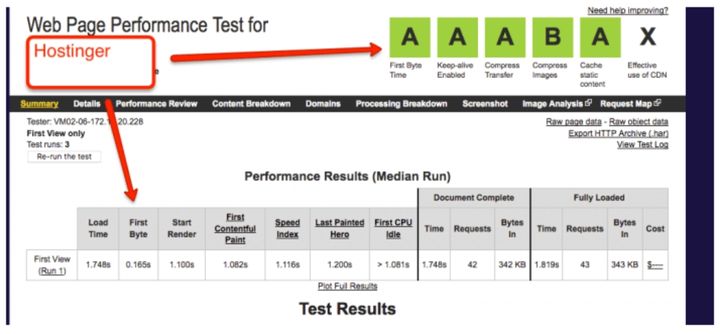
Hostinger’s default memory allocations were great. If your site is image-heavy, their SSD drives are a plus – but their configurations seem off for brand-new users.
The bottom line is that Hostinger is inconsistent when it comes to hosting performance, which is something to be aware of.
Limited Disk Space
For an apples-to-apples comparison of hosting companies, I break things down into Core and Bonus hosting features.
Core hosting features include the “3 D’s” – domains, databases, and disk space. Bonus features include anything from website builder software to advertising credits to backend software.
One of Hostinger’s cons is its plan limitations – specifically, its caps across disk space.
With their Single Plan, you’re limited to one website and domain and 50GB of disk space. If you have one small website, this isn’t a huge problem. But it can be limiting if you want to scale (or if you are in an image-heavy category like beauty or travel).
Hostinger also limits disk space on their mid-tier and higher-tier plan, too.
Again, if you’re planning on creating a smaller site and won’t have much need for disk space to store images, files, etc.), then this isn’t a huge problem for you.
But if you’re looking to add advanced functionality to your site – like PDF downloads on an educational website – or storing a ton of images on a beauty website), your hosting plan needs to have the capacity to handle it.
Limited Customer Service
As I’ve mentioned in my best web hosting review article, you can’t trust that one individual’s opinion that a company has either amazing or horrible customer service. It’s too hard to know, based on a single interaction, if you are dealing with the one amazing or the one horrible employee or if it’s the general culture of a company.
I have limited experience with customer service at Hostinger, but here’s what I do know: they are available 24/7/365, but only via chat.
There’s no email or phone support, and compared to competitors, the limited support channels hurt them. Even with their “Priority Support” add-on, you don’t have the ability to hop on the phone with a REAL, LIVE person.
This is one of those things that doesn’t matter until it does, and then it matters (i.e., when your site goes down and you need immediate assistance). It’s not a deal-breaker, but it is a pretty big con.
Limited Extras
While not critical, many extra features in web hosting are essential to run a safe and secure website in a world of constant cyberattacks and automated hacking.
While most hosting companies are moving towards bundling basic security extras, Hostinger charges for them à la carte (see the below image).
Hostinger also charges for Priority Support. On its own, that’s not odd. But what is odd is that you don’t get any additional channels. And the price is 4x what you are paying for your actual hosting.
Their upcharges are not a huge deal if you simply factor them into your total price (which would still beat many competitors). But it reminds me of those super-cheap budget airlines like RyanAir or Spirit Airlines who sell you a cheap ticket but then charge at the last minute for things like overhead bin space, tray tables, and other assumed basics.
Company Reputation
Every company has growing pains. And no company should be held to its past sins forever. Nobody hesitates to buy Tylenol or Ford cars. However, I think customers should be aware of past happenings to make an all-around decision.
While the Hostinger brand is pretty clean, the company Hostinger has quite a history of growth at any cost and corner-cutting. They had a massive customer hack in 2015 and a more recent one in 2019.
That in and of itself isn’t super-noteworthy. But for a hosting company, the shortcuts that came to light were pretty eye-brow raising. Across customer forums, they have had some notoriety for inconsistent performance.
Hostinger Alternatives
Here’s a head-to-head comparison between Hostinger and some leading web hosting platforms, all of which I have experience using.
Hostinger vs. GoDaddy
GoDaddy is well-known in the web hosting industry, though they are primarily a domain registrar, not a hosting company. They’ve improved as a web host since 2013, but their main selling point is their deeply discounted introductory pricing. And on price alone – Hostinger is competitive – but GoDaddy provides more features. Between GoDaddy and Hostinger, I recommend GoDaddy. Learn more in my GoDaddy review.
Hostinger vs. HostGator
Hostinger and HostGator have some key differences. HostGator is a much larger company and operates out of Newfold Digital’s Houston and Utah data centers. They have very affordable upfront pricing, but Hostinger is cheaper.
Pricing aside, HostGator has more features and support channels. I think HostGator has more to offer most website owners, and I run most of my personal projects on HostGator.
Hostinger vs. Bluehost
Like HostGator, Bluehost is another large competitor. They are one of the biggest brands in hosting. They used to (pre-2015) have a very similar pricing setup to Hostinger but with better support. However, Bluehost has changed its plans and moved “upmarket.” On raw pricing and basic features, Hostinger is a better choice.
Bluehost is good if you’re looking for higher quality, better options, and better branding.
Hostinger vs. Siteground
SiteGround is one of the fastest-growing independent hosting providers. They operate out of Bulgaria with regional data centers and have similar data center reach. If you want similar features at a very cheap price, Hostinger is for you.
If you don’t mind paying more, SiteGround is a more established company with better performance and more support channels.
Hostinger vs. InMotion Hosting
InMotion Hosting is one of the largest and fastest-growing hosting providers. They offer a full spectrum of hosting services. This website uses a VPS server from InMotion Hosting. They’re more expensive than Hostinger’s pricing specials but offer a much better product on every consideration.
InMotion also has a separate brand, Web Hosting Hub, offering entry-level shared hosting plans. They are more expensive than Hostinger but provide a much better product and more options inside their plans.
FAQs
Final Thoughts
Overall, I found Hostinger hosting to be suitable for what they are. They’re inexpensive, and they will perform just fine if you have a small website. And if you are outside the US, they’ll be a solid option with data centers closer to your audience.
If pricing is your main consideration, and you don’t mind the plan limitations, Hostinger is the right web host.
If you are looking for an affordable shared hosting company with good intro pricing, better long-term pricing, and a much better product, check out InMotion Hosting.
Check out HostGator if you want the option to pay monthly or iPage if you want extreme discounts. And if you want to do more research, check out my best WordPress or web hosting article.

